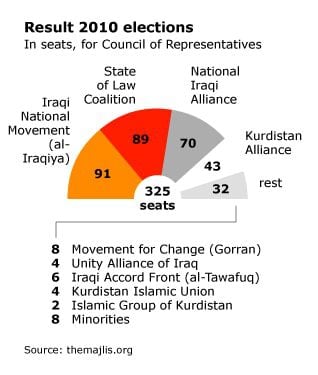The next opportunity for Iraqi Prime Minister al-Maliki and his list would be the elections for the Council of Representatives (the Parliament of Iraq) that were scheduled for January 2010. Much went wrong in the run-up to these elections. A series of large bomb attacks on government offices in Baghdad on 19 August, 25 October, and 8 December 2009, brought back old fears and undermined the credibility of al-Maliki’s law-and-order government. Because disagreement and mistrust had prevented the resolution of important issues – such as the structure of the state (federal, but how decentralized?), the control and distribution of the oil revenues, and Kirkuk –.

all the main parties tried to make use of the elections to gain concessions or settle accounts. It took so long for agreement over a new election law to be reached that the elections had to be postponed until 7 March 2010. Tensions increased further after about five hundred candidates were banned at the last minute for alleged links to the disbanded Baath Party.
The elections brought a narrow victory for the Iraqi National Movement (al-Iraqiya), a secular nationalist coalition with a strong Sunni Arab following, led by former interim Prime Minister Iyad Allawi, himself a secular Shiite.
Al-Iraqiya won 91 of the 325 seats (24.7 percent of the vote), just two seats more (89; 24.4 percent) than the State of Law Coalition (Shiite dominated) of acting Prime Minister al-Maliki. The National Iraqi Alliance (Shiite Islamist) got 70 seats (18.2 percent), while the Kurdistan Alliance (KDP and PUK) won 43 (14.6 percent) and Gorran eight (4.1 percent). Four remaining parties or lists won fewer than ten seats each. The turnout was 62.4 percent (79.6 percent in 2005). The new Parliament convened on May 14.
The main parties, al-Iraqiya and the State of Law Coalition, both needed the support of other parties or lists to obtain an absolute majority in Parliament (163 seats). Al-Iraqiya was unable to form a majority coalition, however, leaving the field to al-Maliki.
After months of protracted negotiations and outside interference, al-Maliki’s State of Law Coalition managed, on November 11, eight months after the elections, to reach a deal with the National Iraqi Alliance and the Coalition of Kurdistan Lists (KDP, PUK, Gorran, and two other small Kurdish parties), only after assurances about the implementation of Article 140 of the Constitution were forthcoming. As part of the deal, Talabani (a Kurd) was re-elected President by Parliament. Usama al-Nujayfi of al-Iraqiya was chosen speaker of Parliament, while Allawi was supposed to become the head of a yet-to-be-created body, the National Security Council for Strategic Policy. On 22 December 2010 the coalition government, led by al-Maliki, received majority support from Parliament.

